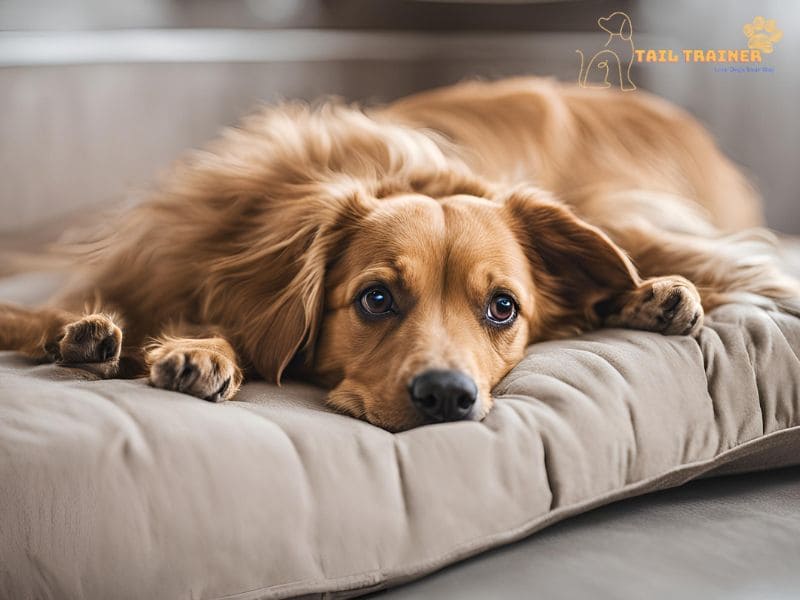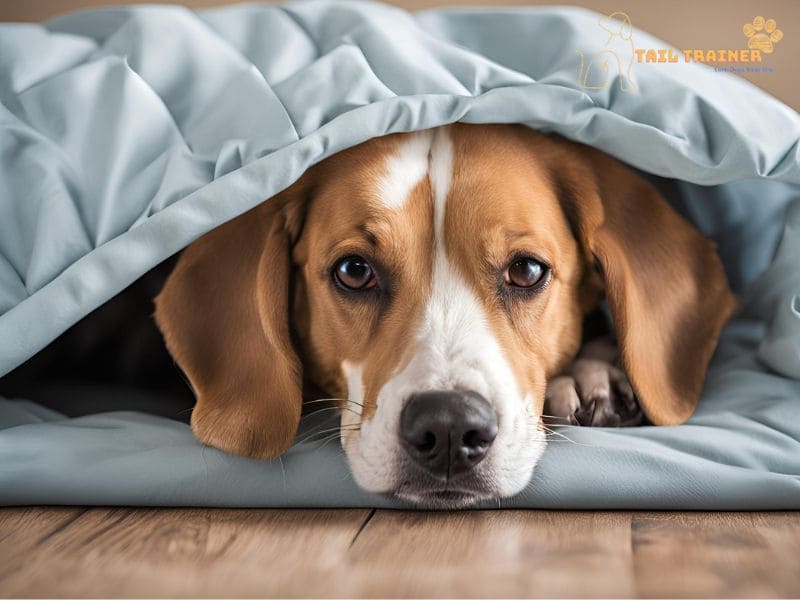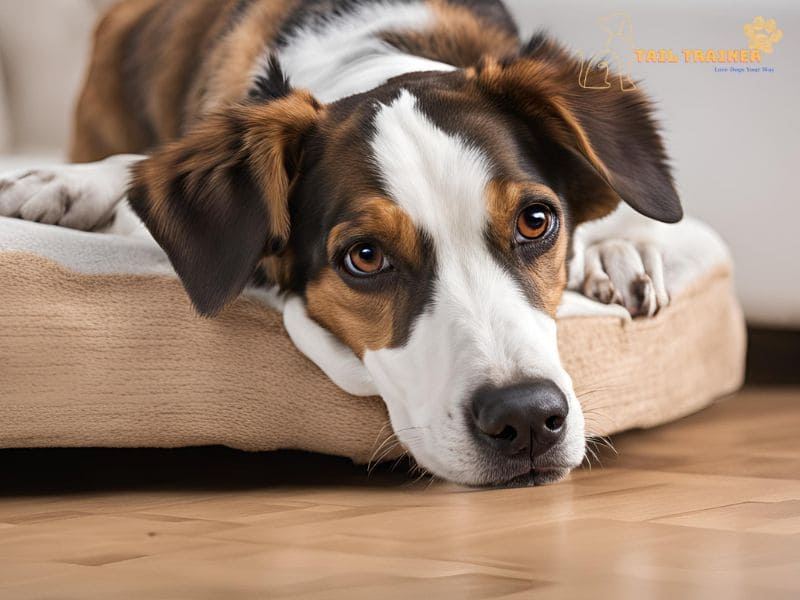Why did my dog pee on his bed? This is a common concern among dog owners, as it seems unusual and frustrating. Understanding the root causes of this behavior can help you address it effectively. Factors like medical issues, anxiety, and poor housetraining can all contribute to this behavior.
Key Takeaways
Dogs may pee on their beds due to medical conditions, anxiety, confusion, or improper training. Identifying the cause can help resolve the issue through proper training or veterinary care.
Understanding Why Dogs Pee on Their Beds

One of the most confusing things for dog owners is witnessing their dog peeing on its own bed. Dogs typically avoid soiling their resting areas, making this behavior unusual. To address this, it’s essential to understand why it happens and what might be causing it.
Medical Reasons for Peeing on the Bed
Medical conditions are among the most common causes of unusual urination behavior in dogs. If your dog suddenly starts peeing on its bed, it’s wise to consult a veterinarian to rule out potential health issues.
- Urinary Tract Infection (UTI): Dogs suffering from a UTI may experience a sudden urge to urinate, leading to accidents. UTIs can make it difficult for dogs to control their bladder, increasing the likelihood of them peeing on their bed.
- Bladder Stones: Bladder stones can cause pain and discomfort, leading to frequent urination or accidents. They may also trigger inflammation, making it harder for the dog to hold urine.
- Incontinence: Incontinence, often seen in older dogs or those with hormonal imbalances, can cause accidental urination. This condition leads to uncontrolled urination, which may include urinating on the bed.
- Diabetes: Dogs with diabetes may drink more water than usual, resulting in increased urination. If not managed properly, this can lead to accidents, even in well-trained dogs.
Anxiety and Stress-Related Causes
Anxiety is another major reason for dogs peeing on their beds. Dogs may develop anxiety due to changes in their environment or routine, separation anxiety, or loud noises.
- Separation Anxiety: Dogs with separation anxiety may urinate on their bed as a response to being left alone. They may associate their bed with comfort, and in moments of stress, may urinate there.
- Loud Noises: Thunderstorms, fireworks, or construction noises can trigger anxiety in dogs. Some dogs may pee in unusual places, like their beds, during these events.
- Change in Environment: Moving to a new home, a change in family dynamics, or even the arrival of a new pet can cause stress in dogs. This stress can manifest as peeing on the bed.
Behavioral Factors Leading to Peeing on the Bed
In addition to medical and anxiety-related causes, behavioral issues also play a significant role in this behavior.
- Marking Territory: Some dogs may pee on their beds to mark territory, especially in multi-pet households. This behavior is more common in unneutered or unsprayed dogs.
- Inadequate Housetraining: Dogs that haven’t been properly housetrained may not understand where they should urinate. If a dog is not clear on where to go, it may end up peeing on its bed.
- Confusion and Habituation: In some cases, dogs can develop a habit of peeing in one area, even if it’s their bed. This can happen if they associate the scent of their urine with that location.
How to Address and Prevent Bed Peeing Behavior

Understanding the cause is crucial in addressing this behavior. Whether the issue stems from health problems, anxiety, or behavioral factors, there are steps you can take to prevent it.
Step 1: Rule Out Medical Issues
The first step in addressing this behavior is to rule out any potential health problems.
- Visit the Vet: A thorough medical check-up can help identify any underlying medical conditions contributing to the behavior.
- Medical Treatments: Conditions like UTIs, bladder stones, or diabetes require proper medical treatment. Follow your vet’s recommendations and administer prescribed medications as directed.
Step 2: Address Anxiety and Stress
If anxiety is the root cause, you need to focus on calming techniques and gradual adjustments to your dog’s routine.
- Create a Safe Space: Ensure that your dog’s bed is in a quiet, comfortable area where it feels safe.
- Use Calming Aids: Calming aids, such as pheromone diffusers or anxiety wraps, can help reduce stress levels.
- Gradual Desensitization: If the anxiety stems from loud noises or separation, try gradual desensitization. For example, practice short separations and slowly increase the duration.
Step 3: Improve Housetraining
If inadequate housetraining is the cause, consistent and patient training is essential.
- Establish a Routine: Set a consistent feeding and bathroom schedule. Dogs thrive on routine, and a predictable schedule can reduce confusion. If you need help with training techniques, consider enrolling in a professional dog training course to develop better habits and curb bed peeing behavior.
- Positive Reinforcement: Praise your dog or offer treats when it urinates in the correct location. Positive reinforcement strengthens desired behaviors.
- Use Crate Training: Crate training can help establish boundaries and reduce the likelihood of bed peeing. Ensure that the crate is large enough for comfort but small enough to discourage urination.
Advanced Tips for Managing Bed Peeing Behavior

Addressing persistent cases may require more advanced techniques. Here are some effective methods to further curb this behavior.
Adjusting Sleeping Arrangements
Sometimes, modifying where your dog sleeps can make a significant difference.
- Use Waterproof Bedding: Until the behavior is under control, use waterproof bedding to protect your dog’s bed and make cleaning easier.
- Try New Locations: Experiment with placing the bed in different locations to see if the behavior changes. A new spot may help reset your dog’s habits.
Implementing Professional Training
If the behavior persists despite your efforts, professional training may be needed.
- Consult a Dog Trainer: A professional trainer can help identify the root cause and work on correcting it through behavior modification.
- Consider Behavior Therapy: For anxiety-related cases, behavior therapy can be highly effective. It involves gradually exposing the dog to anxiety triggers in a controlled manner.
Frequently Asked Questions (FAQs)
1. Can a dog pee on its bed due to illness?
Yes, illnesses like UTIs, bladder stones, or diabetes can cause dogs to lose control of their bladder, leading to accidents on their bed.
2. Why does my puppy pee on its bed even after going outside?
Puppies often lack full bladder control and may have accidents on their bed. Consistent training and a set schedule can help minimize these incidents.
3. Is it normal for senior dogs to pee on their bed?
Senior dogs may suffer from incontinence, leading to bed peeing. It’s common in older dogs, and veterinary care is recommended to manage this condition.
4. How can I stop my dog from peeing on its bed?
Addressing potential medical issues, improving housetraining, and reducing anxiety are key steps. Consistent training and positive reinforcement can help break this habit.
5. Could diet affect my dog’s urination habits?
Yes, dietary factors, especially excessive water intake, can lead to frequent urination. Adjusting your dog’s diet with the help of a vet may reduce this behavior.
